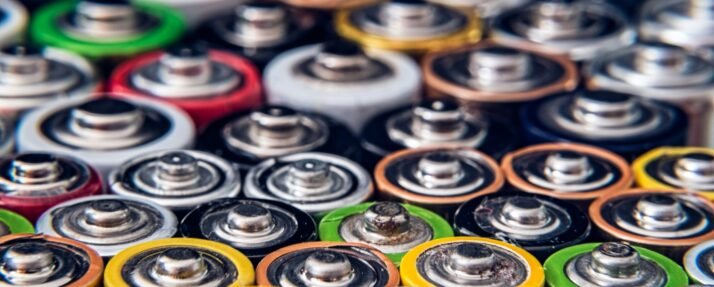Contact us today for your Free Quote
Batteries are everywhere, powering many of the devices essential to modern life. However, the majority of fires in the waste management industry are caused by the incorrect battery disposal. This is why Bywaters works closely with our clients to provide safe and sustainable battery recycling solutions.
The Problem with Batteries
From a waste management perspective, batteries are challenging to handle because they are composed of various materials. While many of these are harmless and can be recycled, some are hazardous and require special handling to mitigate risks.
One significant problem in disposing of batteries is the sheer volume we use. From laptops and phones to cars and household appliances, batteries power our lives. that we throw away 600 million batteries each year in the UK. This staggering number highlights the importance of safe disposal practices.
Incorrectly disposing of batteries can pose risks to workers who are unprepared to handle hazardous materials and increase the danger of large fires in waste management facilities.
Fire Risk from Lithium-Ion Batteries
The greatest danger posed by batteries is the risk of fire. This is particularly concerning in the waste management industry, where it remains the most significant risk faced by companies like Bywaters.
Lithium-ion batteries, commonly found in smartphones and other personal technology, can catch fire rapidly. Industrial waste management sites, such as our materials recovery facility in Bow, store large amounts of dry mixed recycling and cardboard waste. In such environments, fires can spread quickly and cause millions of pounds in damage if not extinguished immediately.
A demonstration of how quickly a lithium-ion battery can ignite can be seen in this video. Imagine this ignition process occurring in the back of a dustcart or among flammable materials in a recycling facility—it can quickly escalate into a major hazard.

The Rise of Vapes and Their Battery Disposal Issues
The increasing popularity of vapes, or e-cigarettes, adds a new dimension to the battery disposal issue. Vape batteries, typically lithium-ion, are small but powerful, and pose significant fire risks if not handled correctly.
Fire Incidents and Rising Numbers
Recent data has highlighted a worrying trend in the number of fires caused by improperly disposed batteries, including those from vapes. In 2023, there were over 1,200 battery fires in bin lorries and at waste sites in the UK, a 71% increase from the 700 fires reported in 2022. This surge underscores the growing risk posed by lithium-ion batteries, which are prevalent in many modern devices, including vapes.
The Scale of Vape Battery Disposal
Research from the Recycle Your Electricals campaign, conducted by Material Focus and Opinium, shows that over 1.1 billion electricals and 449.9 million loose batteries were discarded in the past year. Alarmingly, this includes 260 million vapes. This significant number of discarded vapes contributes to the rising incidence of battery fires in waste management systems.
Public Awareness and Education
Nearly half of UK adults are unaware that electrical items containing rechargeable batteries can catch fire if crushed or damaged . This lack of awareness exacerbates the problem, as many people inadvertently dispose of vapes and other battery-powered devices incorrectly. As Scott Butler, Executive Director of Recycle Your Electricals, emphasized, it is crucial to educate the public on the dangers of improper battery disposal to prevent these fires and reduce their impact on local communities and the environment.
Preventive Measures and Campaigns
To address this issue, initiatives like the “Stop Battery Fires campaign” from Recycle Your Electricals and the National Fire Chiefs Council have been launched to raise awareness about the importance of recycling electricals and batteries properly. These campaigns aim to inform the public about the dangers of lithium-ion batteries and provide guidance on safe disposal practices.
Phil Clark from the National Fire Chiefs Council described fires involving the incorrect disposal of lithium-ion batteries as “a disaster waiting to happen.” He stressed that these incidents are preventable through proper disposal and recycling of electrical items containing these batteries.
The Environmental and Financial Impact
Improperly disposed vape batteries not only pose a fire risk but also contribute to environmental pollution. These batteries contain valuable materials that can be recycled and reused, preserving natural resources. Additionally, the financial cost of battery fires is significant. Insurance claims related to lithium battery fires can reach up to £20 million, highlighting the economic impact of these preventable incidents.

E-Bike Battery Risks: A Growing Concern
In addition to vapes, e-bike batteries are another emerging concern. The tragic death caused by an e-bike battery fire in Avon has raised awareness about the dangers posed by lithium-ion batteries. Poor-quality charging kits and sub-standard Battery Management Systems (BMS) are often the culprits behind these fires. These kits, especially those marketed as ‘universal’, may not match the specific battery they are charging, leading to significant fire risks .
With an estimated two million e-bikes in the UK, battery fires are on the rise, although they occur less frequently than car fires. Given that e-bikes are often charged indoors, it’s crucial to follow safety guidelines to mitigate risks. The UK government recommends buying e-bikes and chargers from reputable sellers, following manufacturer instructions, and avoiding modifications to batteries .
Before a lithium-ion battery catches fire, there may be warning signs such as excessive heat, smoke, swelling, leaks, or unusual smells. If any of these signs are observed, it is critical to stop using or charging the battery immediately.

Mitigating Risk
To combat the risk to both our facility and the lives of our employees, Bywaters has implemented a wide range of fire prevention measures. These include thermal imaging cameras, sprinkler systems, auto-detecting water cannons, an auto-suppression system throughout the facility, and a dedicated rapid response team.
The number of preventative actions we need to take as a company is evidence of the significant risk posed by batteries. In addition to these measures, we ensure that trained staff are on each shift to respond to any incidents as they occur. Additionally, we strive to remove batteries from other waste streams as early as possible.
Our team of pickers works diligently to remove batteries from waste as it moves into our materials recovery facility on beltlines. This helps mitigate fire risk, but unfortunately, it is impossible to eliminate 100% of batteries as they are often very small and hard to detect.
The best option is to work with our clients to educate them on the need to dispose of batteries correctly. Ensuring that batteries don’t turn up in unexpected places and providing an all-round recycling services for our customers is key.
Specialised Battery Recycling Services
To avoid all the hazards discussed above, Bywaters offers specialised battery recycling services to all our clients. This is the safest and most sustainable way to dispose of used batteries, and we encourage all our partners to use these services.
Streaming batteries into a separate waste stream not only mitigates the risk of fire but also ensures that all recyclable elements are reused, preserving natural resources. Our dedicated recycling partners process these batteries, ensuring a safe and environmentally friendly disposal process.
The dangers of improper battery disposal are evident, with fire hazards being a primary concern. As vapes add to the growing number of batteries in use, it is more important than ever to understand and follow safe disposal practices. By doing so, we can protect our environment, health, and communities from the risks associated with battery disposal. Bywaters is committed to promoting safe, sustainable battery recycling solutions and working closely with our clients to ensure best practices.
If you want to find out more about how our battery recycling services can work for your business, please get in touch.


